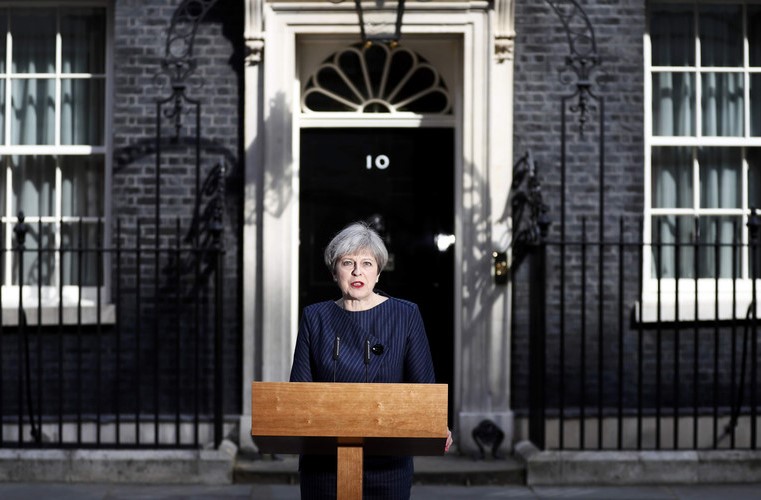Reuters photo
By
Tom Arms
The Lady turned—big time.
On five separate occasions since the Brexit referendum British PM Theresa May unequivocally refused to call a general election. The voters would have to wait until 2020 for another judgement vote on Brexit.
Then she wanders off on a walking holiday through the hills and valleys of Wales and returns marching in the exact opposite direction. There will be, she announced, a British general election on June 8th, and the issue will be Brexit, Brexit and Brexit.
Why the U-turn? And what impact will it have on the British political scene, British negotiations with the EU, the EU and British and European stability?
Mrs May is a politician. She has good reason to believe that she will win a snap election, substantially increase her majority in parliament and extend the life of the conservative government by at least another two years.
The opinion polls put the Conservatives 20 points ahead of the Opposition Labour Party. One of the reasons for their success is the no-nonsense firm leadership of Mrs May compared to the lacklustre efforts of Jeremy Corbyn (and that is being kind to Mr Corbyn). Mrs May has a net approval rating of plus 17 points. Corbyn’s standing has fallen to minus 38.
At the same time, the threat from the far-right UK Independence Party (UKIP) is fast receding as Mrs May has out-Brexited the Brexit party of pre-referendum Britain.
The biggest threat now comes from the centre-left Lib Dems. They have carved out a niche as the only pro-EU party. They are the only ones who provide a home for the 48 percent who voted to remain in the European Union. But the Lib Dems were decimated in the 2015 general election and now have only nine seats in the House of Commons.
They have been taking on new members at a mind-boggling rate, winning local by-elections, performing well in parliamentary by –elections and actually winning one with a substantial majority. But they are starting from a low base.
However, Mrs May has only a 12-seat majority. The Lib Dems may be a long way from government, but they are only seven seats from bringing down the government—possibly in the middle of negotiations with Brussels.
And the number of by-elections may have been on the verge of rapidly increasing. According to former UKIP leader Nigel Farage, Britain’s Crown Prosecution Service was about to create up to 30 by-elections in seats won by Conservatives in 2015. The reason? Electoral fraud by Conservative Central Office. Under British law, the issue was shelved the moment Mrs May announced the election.
Finally, there is the more noble reason given by Mrs May. She wants to strengthen her mandate in order to secure the best possible deal in the upcoming divorce negotiations with EU hagglers.
Mrs May will almost certainly win with an increased majority. The bookies are giving her 10 to one odds. But the repercussions may not be entirely to her liking.
For a start the problems of Northern Ireland and Scotland will increase. A recent election in Northern Ireland put Sinn Fein within spitting distance of an absolute majority. Emboldened by their success, Sinn Fein has started making noises about a referendum on unification with Eire—a move which would almost certainly bring Protestant gunmen back onto the streets of Belfast.
In both Northern Ireland and Scotland Brexit is the catalytical secondary issue which has rejuvenated interest in the first—breaking with England.
The election may also see the death of the Labour Party which has dominated the British left-wing for a century. Jeremy Corbyn’s far left policies are nearly 40 years out of date and his refusal to stand up to the government over Europe—or almost any other issue—has destroyed his personal standing with the electorate. Labour’s general standing has been rocked by the membership repeatedly voting to return Corbyn to the Leadership, demonstrating that the grassroots as well as the Leader are out of touch with the electorate.
The Liberals were the party of the Left in Victorian times and the Lib Dems are their direct descendants. The political pundits are predicting that they will emerge the big long-term winners from the June poll. They may even become the official Opposition Party. They are unlikely to have as many seats as Labour now, but their tough no-nonsense anti-Brexit stand will make them tougher to deal with. Mrs May claims she wants a parliament wholly behind her on Brexit. She won’t get that with more Lib Dems in the House of Commons.
Mrs May also wants a stronger domestic base for her talks with EU officials. At the moment it is weak. She is Prime Minister by virtue of a palace coup rather than a vote of the people—a fact which several European leaders have been quick to point out.
How will a direct electorate mandate affect her position vis-a-vis the EU? Will she become more likely to compromise or will she take a harder and tougher line? Both schools of thought are in the ascendant at the moment. Many think that she has been forced to take her current hard Brexit position because of a strong and vociferous anti-EU lobby from her own backbenchers. With an electoral mandate she can—if she wishes – sideline them.
Another school argues that Mrs May needs the mandate to strengthen her current tough negotiating position. A flexible Mrs May or even tougher one? Either course would have a direct impact on the future stability of Europe.
Tom Arms is the editor of LookAheadnews.com. Sign up now for the weekly diary of world news events.



No Comments Yet!
You can be first to comment this post!